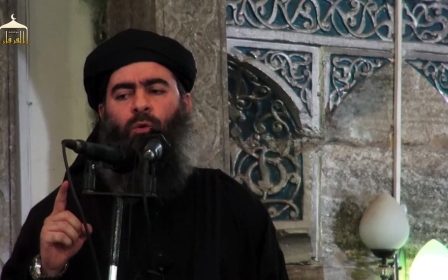Ankara joins air raids on Mosul as Iraqis protest Turkish role
The Turkish air force is taking part in air operations backing the Iraqi and Kurdish Peshmerga offensive to retake Iraq's second city of Mosul from Islamic State (IS) militants, the prime minister said on Tuesday.
"Our air forces took part in the coalition forces' air operations in Mosul," Binali Yildirim told his ruling Justice and Development Party (AKP) parliamentary group in Ankara.
The long-awaited offensive began on Monday with air and ground support from a US-led coalition.
Despite the vast scale of the offensive, progress has so far been relatively slow, with aid organisations expressing grave concern at the fate of civilians inside the city. The Pentagon said on Tuesday night that militants were trapping civilians there "against their will" and using them as human shields.
Yildirim said Turkey was "closely watching" what was happening in Mosul, but did not give details of the nature of the Turkish air support.
Pressed by reporters after his speech as to whether Turkey had indeed taken part in air strikes, Yildirim said he did not know "the operational details," but said there was agreement "in principle" to be part of the coalition.
In a separate speech in Ankara, President Recep Tayyip Erdogan said Turkey did not want to be party to any sectarian conflict in Iraq, but spoke of his concern for "our Sunni Arab brothers, our Turkmen brothers".
Mosul was captured by IS militants on June 2014. But ahead of the offensive, Turkey and Iraq were entangled in a war of words over Turkey's presence in northern Iraq.
Yildirim repeated Erdogan's comments from Monday that Turkey would be involved in the operation and will be "at the table".
He warned that anyone taking steps in the region without taking Turkey into account would be making "big mistakes".
While insisting it cannot be left out of the operation, Turkey has often spoken of its fears over the potential involvement of Shia and anti-Ankara Kurdish militias in the fight for mainly Sunni Mosul.
Sadr leads protests against Turkey
As the Mosul operation got underway, thousands of Iraqis gathered outside the Turkish Embassy in Baghdad on Tuesday to protest against Turkey's military presence in northern Iraq.
Protestors demanded that Ankara withdraw from a base near the city of Mosul, after repeated requests by the Iraqi government.
The demonstrators, which included influential Shia cleric Muqtada al-Sadr, chanted slogans such as "get out occupier".
Earlier this month, Erdogan and Iraqi Prime Minister Haider al-Abadi traded barbs over Turkey's presence in Bashiqa in northern Iraq, where, according to Erdogan, nearly 700 Turkish soldiers are based.
Erdogan insisted Turkey had a historical responsibility to be in Iraq, referring to Mosul's past as part of the Ottoman Empire.
"We will be [present] on the ground and we will be at the table," Erdogan said.
Erdogan told the Iraqi government that "rather than acting tough with us" it should "deal" with militant groups like IS.
Talks to de-escalate crisis
Foreign Minister Mevlut Cavusoglu said an Iraqi delegation was due to arrive in Turkey towards the end of the week, as diplomats try to de-escalate the tensions.
"Both sides essentially have the will to solve this through dialogue," Cavusoglu said Tuesday during a visit to Tashkent, quoted by the Anadolu news agency. He added the delegation would arrive "maybe Thursday".
A top-level Turkish delegation led by foreign ministry undersecretary Umit Yalcin arrived in Baghdad on Monday.
On Tuesday, Turkish Airlines temporarily suspended flights to three major Iraqi cities - Najaf, Basrah and Sulaimaniyh, the airline's spokesman told AFP.
Flights to the Iraqi capital and the Kurdish city of Erbil are continuing after the cancellation of Monday's afternoon services, he added.
'A long battle'
France's Defence Minister Jean-Yves Le Drian on Tuesday said that the battle for Mosul could take "months".
"It could be a long battle, it's not a blitzkrieg... It's a lengthy affair [lasting] several weeks, maybe months," he told reporters in Paris a day after the offensive began.
French Foreign Minister Jean-Marc Ayrault also announced plans to host an international meeting in France on Thursday about the future of Mosul.
"We must anticipate, plan for the 'day after,' and the stabilisation of Mosul after the military battle," Ayrault said, adding that Iran - which wields substantial influence in Iraq - was not invited to the talks.
Stay informed with MEE's newsletters
Sign up to get the latest alerts, insights and analysis, starting with Turkey Unpacked
Middle East Eye delivers independent and unrivalled coverage and analysis of the Middle East, North Africa and beyond. To learn more about republishing this content and the associated fees, please fill out this form. More about MEE can be found here.




